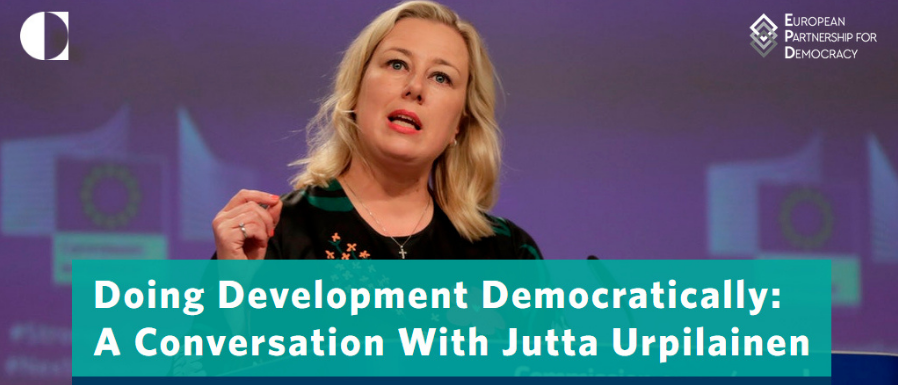On February, 2 2021 the one-hour online conference “Doing Development Democratically: a Conversation with Jutta Urpilainen” was live-streamed. The occasion served to launch the European Democracy Hub—a new platform for research-based discussion on European democracy support, programming, and policy, aiming at engaging stakeholders and offering solutions to democratic challenges. The online conference was moderated by Mr Richard Youngs, from Carnegie Europe, which together with one of the ALDA’s members, the European Partnership for Democracy, co-organized the event.
Mr Ken Godfrey, European Partnership for Democracy Executive Director, introduced the discussion by highlighting how the European Democracy Hub is the result of the cooperation between the two parties, and provides an in-depth analysis and research about democracy. Then, he stressed out the importance of considering how the COVID-19 pandemic will affect democracies, parliaments and freedom of expression on worldwide scale. Therefore, the essential role of the hub in this realm.
Mr. Godfrey enhanced the role of this working-group, set up by prominent academics, practitioners and policy makers to support countries which have some weaknesses in their democracy systems. He recalled, for example, the military coup in Myanmar, driving the attention on the full commitment of the working-group to jointly boost democracy around the world.
A key moment was the European Commissioner for International Partnerships Jutta Urpilainen’s speech. She addressed all her encouragement in the launch of the European Democracy Hub, underlining the importance of being resilient in crisis-period such as the one caused by the pandemic. She also remarked how we have been all witnesses, in certain parts of the World, of human rights violations, and of governments using their powers to silent the oppositions, making the pandemic as an excuse. Furthermore, she highlighted how women and children are now paying the highest price of this pandemic. As a Commissioner, she assured that the EU will continue to ensure inclusivity, sustainability, fairness and fundamental values during our global recovery.
“We want to deliver a real voice to those who need it more than ever”
Moreover, Jutta Urpilainen remained us “that we can never take democracy for granted, but instead we have to promote it together!”, underlying that democracy is not only about elections but also about the participation and empowerment initiatives. She further highlighted the importance of the new EU Action Plan on Gender Equality and Women Empowerment in the framework of a global post-COVID recovery.
Finally, she talked about the fundamental links between geopolitics and democracy, considering also the huge competition existing in Africa among different models of society and governance. On the relations between the EU and the US, Commissioner Urpilainen welcomed Mr Biden’s election as well as his plan for a Global Democracy Summit.
The conversation was followed by a panel debate with two prominent academics: Prof. Staffan I. Lindberg, Director of the Varieties of Democracy Institute and Julia Leininger, Chair of the research programme Transformation of Political peace order at the German Development Institute.
Prof. Lindberg then outlined that 2019 was particularly negative for democracy at a global level: as data show, nearly 2.6 billion people live in countries governed by autocracy and not in democratic ones, including Poland and Hungary in the European Union. As it has for long being studied, life quality is proportioned to democracy: higher the democracy level – better life quality. Prof. Lindberg will work to enhance democracy and human rights in order to reach sustainable development goals in a wide range of areas.
As to Julia Leininger, during her speech she underlined the switch we have been witnessing from a bipolar to a multipolar democratic system. She urged the need for transparency in all democratic systems but she also claimed that democracy can be effective even with some not-total-transparency although academics could argue that this would be against the “pure” idea of democracy.
Referring to Prof. Lindberg’s point about autocracy, she suggested how, benefitting from our knowledge on democracy, we could help civil society organisations in their missions. Moreover, she outlined positive linkage between democratic quality and development outcomes.
Prof. Staffan I. Lindberg further argue that working to protect democracy nowadays means to work strategically in order not to undermine human rights systematically: in a sentence, “We have to get used that we need democracy protection both at a global and at a local level” and that there is no inclusive governance without democratic principles.
The end of the conference was marked by Julia Leininger’s reflections about big changes in multilateralism and multidirectional approach. She drew the attention on the hypothesis of an Action Plan for Democracy, by communicating and being on a dialogue with others. In her opinion, being accountable means being responsible for European citizens and to be open to policy shifts. “What the pandemic showed is that society, democracy and politics have to be integrated: it’s about democracy and social protection to mitigate social cohesion and making political change.”
Keep following Carnegie Europe and the European Partnership for Democracy on their Facebook pages to get to know the latest news and events around the #EuropeanDemocracyHub
